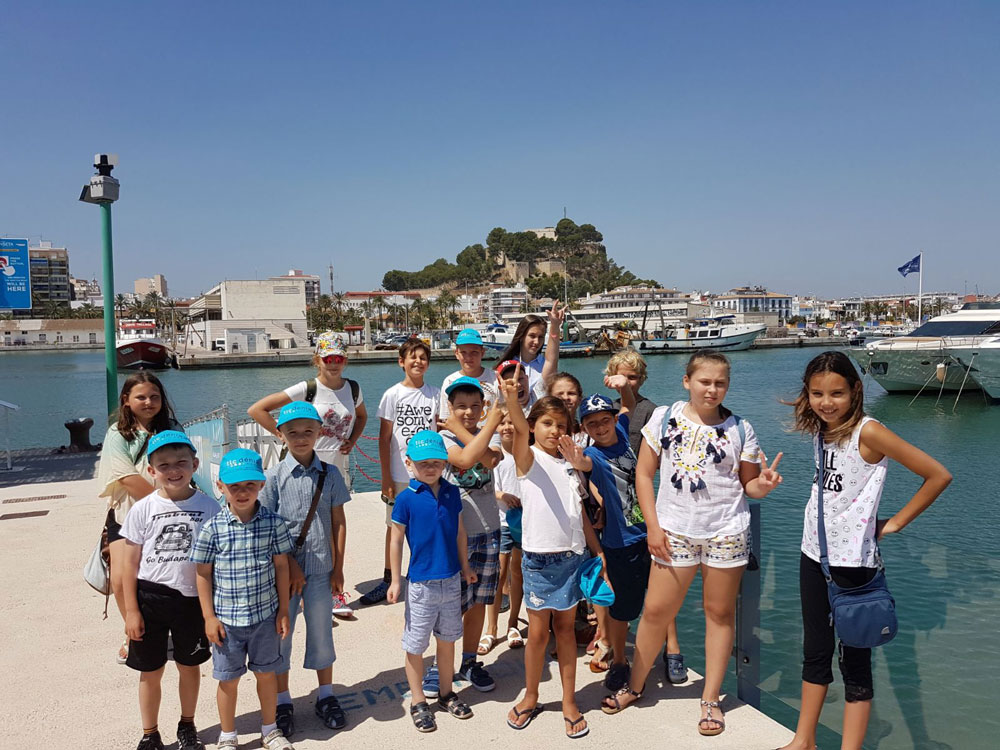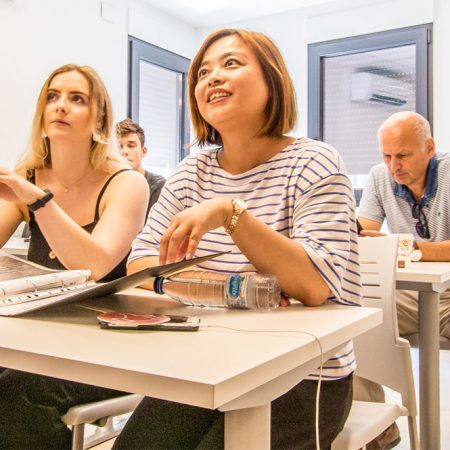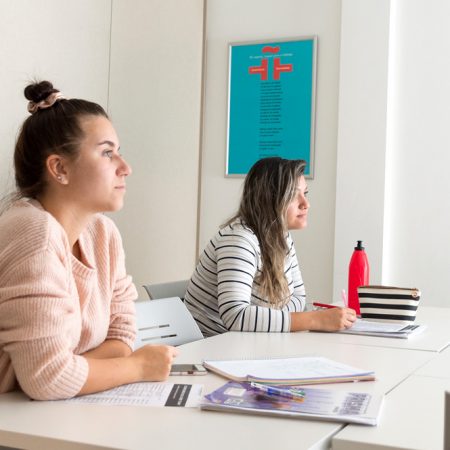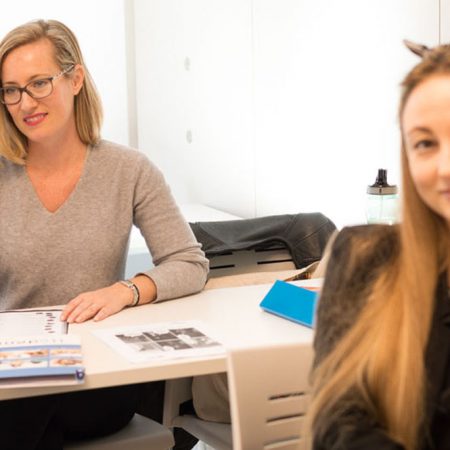SPANISH FOR CHILDREN – SPANISH AND ACTIVITIES (From 5 to 10 years old)
Nº of lessons: 20 lessons per week. 1 lesson = 45 minutes
Schedule: from Monday to Friday from 9.30am to 12.45pm
Nº of students: 14 maximum
Starting dates: this programme takes place from 16th June to 29th August 2025. Children can start any Monday (booking in advance).
COURSE DESCRIPTION:
Children learn Spanish inside and outside the classroom. This course consists of 2 Spanish lessons + break + 2 activities lessons (arts and crafts workshops, excursions and games).
– During the first part, children attend dynamic Spanish lessons. They learn new vocabulary, basic structures, and expressions. They also play games focused on learning Spanish.
– During the second part, we organize activities inside the classroom and also outside to practice the language and get to know Dénia. The activities are planned to make the children practice the new vocabulary.
WATCH THIS VIDEO:
THIS PROGRAMME INCLUDES:
- Materials (books, photocopies, craft material and tools).
- Transfer to and from the craft workshop and excursion venues.
- Certificate of attendance.
- Welcome pack
PRICES: SPANISH FOR CHILDREN – SPANISH AND ACTIVITIES (5-10 YEARS OLD)
+ 40€ registration fee
Course Features
- Lecture 0
- Quiz 0
- Duration Lifetime access
- Skill level All levels
- Language Spanish
- Students 0
- Assessments Yes
COURSE STARTING DATES:
This programme takes place from 16th June to 29th August 2025. Children can start any Monday (booking in advance).
COURSE METHODOLOGY:
Encouraging children and teens to learn Spanish and making it easy for them is one of the biggest gifts we can give them. It’s a fact that knowing more than one language opens plenty of doors, not only work-wise, but also socially, mentally and culturally. Some benefits of learning a language at an early age are better linguistic skills (ever heard of children referred to as “sponges”?), higher academic achievement and cognitive benefits such as enhanced creativity, better critical thinking and problem solving skills, among others.
Children and teenagers are in a key period of their lives in which learning a language results much more natural to them. They are like “sponges” and are therefore able to absorb the knowledge of a new language extremely fast.
Learning a language has many cognitive benefits for them: it develops their creativity, their critical thinking, problem solving and their written and oral expression.
Younger kids start to formulate their first sentences through games and crafts, as they learn by imitation. Teenagers learn Spanish in a dynamic way, not only with academic exercises but with dynamic interactive activities: role-playing, project creation, debates, etc. Research shows that knowing more than one language opens many doors, not only professionally but also personally and cognitively.







Excellent language school! I study Spanish here and I really like it. Experienced teachers, international students and interesting lessons completely immerse you in the atmosphere of the language you are learning. I recommend it to everyone! See the review here
I have studied Spanish at TLCdénia for three months and I have learned a lot. The teachers are friendly, patient and fun, they helped me a lot. I especially want to thank my teacher Paula, for always being an excellent teacher! All classes were good and fun. Thank you for everything TLCdénia! See the review here
A great language school with lots of nice people, I would especially like to thank our teacher MAYRA, without her it probably wouldn’t have been half as much fun! Thank you! 🤩 See the review here
I had the 20-hour language course for 6 weeks and I was thrilled. I learned a lot during that time and met very nice people. I like it so much that I extended it and will do more courses here. See the review here
I took my DELE language exams here and was so impressed by the friendliness of all the people working in the academy, both the administrative and teaching staff. Calm, welcoming and smiling. The whole school is clean, bright, and well maintained, and I saw several students taking the exams who had obviously studied there, and who were welcomed by name by their teachers. I imagine it must be a good place to study. See the review here
A language school in Denia is an excellent choice for learning Spanish. I have been studying at this school since last year and am very pleased: professional and energetic teachers, interesting lessons. The school is located in the center of the beautiful city of Denia and occupies an entire building. Sometimes in the summer we practiced on the roof, which was wonderful. Air conditioning works well in the classrooms in summer, which is important for hot days. Excellent modern equipment helps you master the language. The classes are not boring and very intensive. I tried different courses on the Costa Blanca, I am sure that this school is the best!!! See the review here
I’ve had 4 weeks of spanish in this school and I can say that I have been very satisfied. They adapt to your needs and everyone is very friendly. See the review here
Such lovely people! Highly recommend. See the review here
Our wonderful study group is at an exciting stage in our language journey, already 22 weeks into intensive Spanish learning and our passion and progress is noticeable. One day, I didn’t have enough space in my class, where I regularly studied, because two girls from England suddenly wanted to study in an adult group. One lesson I sat in a chair in the middle of the classroom; during the second lesson they found us a larger audience. Here issues are resolved quickly. Calm, only calm and everything for studying❤️!
The school creates good conditions and we are all real hard workers: we support each other, exchange knowledge and are always ready to help when someone faces a difficulty.
All the photos show that summer adds a special brightness to our faces. Many pleasant moments in the lessons at the Spanish Language School #tlcdenia Classes are intertwined with communication and feasting, and bring us closer to the goal – fluent and confident command of the Spanish language.#costablanca #verano #tlcdenia #español #actividad
The teachers who guide us are simply wonderful. Gracias, Mayra ❤️! Another case: the coffee machine in our building broke down. One lady kindly explained this to me and suggested we go to the nearby school building. We walked side by side, talked, told something about ourselves. We got to the coffee machine, completed the order together, and then I decided to demonstrate my Spanish, I said: soy Guzel, ¿y tú? And she answers me: Soy tu directora Marie Carmen. This is how I met the headmistress of the School.” See the review here
A great school! Very well organized. Great teachers. Highly recommended. See the review here
Hello ! I took the intensive 30 course for 2 weeks via educational leave and the course was worth it for me. All of the staff are very friendly and helpful. The classes are mixed so that almost everyone has the same level and the groups are kept small. The TLC Denia also offers activities after class to get to know the language and culture better. You can easily reach the school by bus, bike and car as the school is located almost directly in the city. Denia also offers a lot to combine a language course and a relaxing holiday. I will definitely come back next year.” See the review here